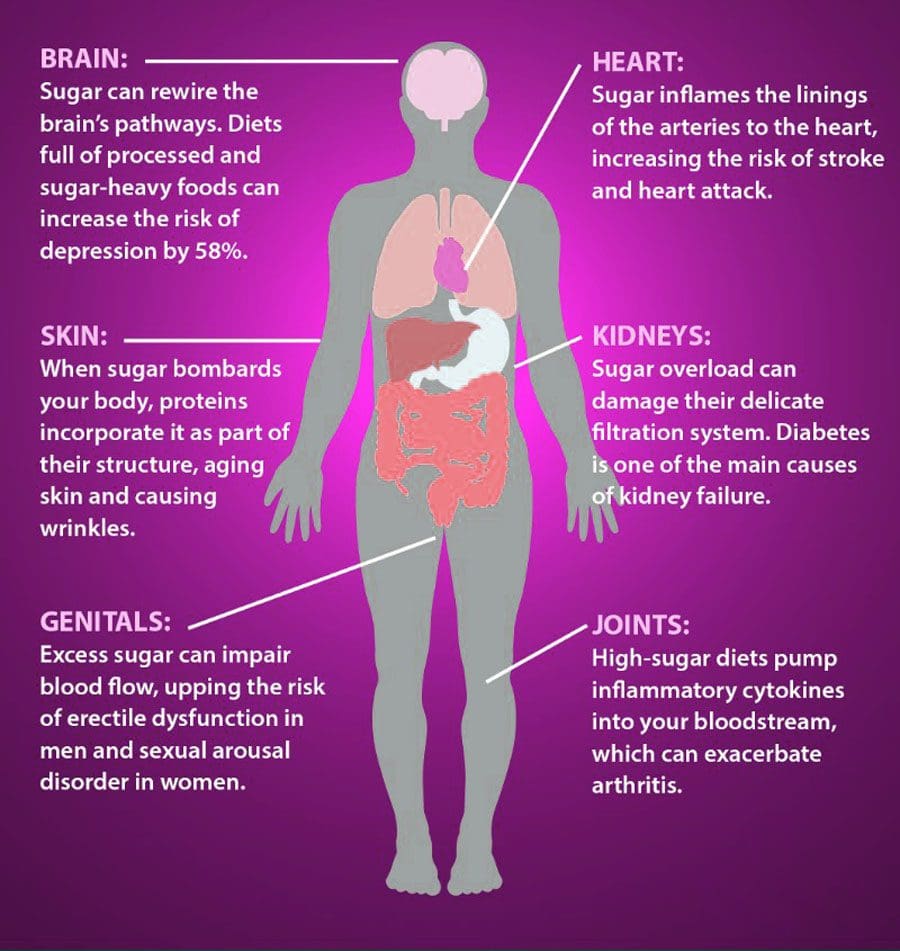Sugar is a highly addictive carbohydrate linked to obesity, diabetes, metabolic disorders, and mood disorders. Individuals ready to phase out sugar will improve overall health, regardless of age and health status, but the transition can be challenging. A sugar-free or low-sugar diet can help individuals with blood sugar or systemic inflammation, including pre-diabetes, diabetes, heart disease, PCOS, hormonal imbalances, and autoimmune diseases.
Phase Out Sugar
Low-Sugar Diet
A low-sugar nutrition plan focuses on maintaining a low overall sugar intake that limits sugar to avoid blood sugar instability and general inflammation.
- This means choosing food with natural sugars like fruit, certain dairy products, vegetables, and natural sugars.
- Reducing and replacing packaged or prepared foods with added sugars, like store-bought tomato sauce, cured meats, or frozen meals.
- Reducing and replacing processed foods like snack items and fast food.
- Reducing restaurant food that can add sugar for flavor and appetite stimulation.
Recommended Ways
Consult a healthcare provider, dietician, or nutritionist before altering diet, physical activity, or supplement routine.
Eat More Healthy Fat
- Healthy fat is more satisfying, making the body feel fuller for longer.
- Eating more healthy fat decreases sugar cravings and reduces sugar withdrawal symptoms.
Healthy fats include:
- Avocados
- Nuts
- Seeds
- Coconut oil
- Extra virgin olive oil
- Salmon, mackerel, and sardines
More Sleep to Balance Hunger Hormones
- Studies have shown that shorter sleep periods are associated with an elevated body mass index.
- Not getting enough sleep negatively impacts the appetite-regulating hormones leptin and ghrelin, causing cravings for instant energy that typically comes from sugar snack products.
- Individuals are recommended to get at least 7-9 hours per night. Enough sleep will balance the appetite hormones and decrease sugar cravings.
Manage Stress to Control Emotional Eating
Emotional eating is common when stressed out. Finding something to take the mind off sugar cravings is necessary when having a stressful day. This includes:
- Talk with a friend
- Learning meditation skills
- Using breathing techniques
- Take a walk, jog, bicycle ride, skate, etc.
- Drink stress relief tea
If sugar cravings are more serious, then professional help is recommended.
Drink More Water
When school, work, and life is happening, individuals can think they’re hungry; however, it is not hunger but the body needing hydration.
- Drink one to two glasses of water when cravings kick in to satisfy the craving.
- Drinking water throughout the day helps keep cravings down and helps with sugar withdrawal symptoms.
- Individuals who have difficulty drinking water should add slices of fruit, cucumber, or mint to make it more pleasing.
- Try sparkling mineral water or naturally flavored carbonated waters.
- Try healthy juices, like celery, beet, or carrot juice, instead of water.
Sugar-Free Substitutes
Sugar substitutes are available, but not all are considered healthy.
- Individuals should be cautious about using sugar-free alternatives to phase out sugar.
- A study found that zero-calorie sweeteners such as aspartame and sucralose were actually found to increase, not decrease, weight.
- Stevia and monk fruit extract has been shown to be safe and has no negative side effects.
- Consult a dietician or nutritionist to determine the healthiest for you.
What Happens To The Body
The information herein is not intended to replace a one-on-one relationship with a qualified healthcare professional or licensed physician and is not medical advice. We encourage you to make your own healthcare decisions based on your research and partnership with a qualified healthcare professional. Our information scope is limited to chiropractic, musculoskeletal, physical medicines, wellness, sensitive health issues, functional medicine articles, topics, and discussions. We provide and present clinical collaboration with specialists from a wide array of disciplines. Each specialist is governed by their professional scope of practice and their jurisdiction of licensure. We use functional health & wellness protocols to treat and support care for the injuries or disorders of the musculoskeletal system. Our videos, posts, topics, subjects, and insights cover clinical matters, issues, and topics that relate to and directly or indirectly support our clinical scope of practice.* Our office has reasonably attempted to provide supportive citations and identified the relevant research study or studies supporting our posts. We provide copies of supporting research studies available to regulatory boards and the public upon request.
We understand that we cover matters that require an additional explanation of how it may assist in a particular care plan or treatment protocol; therefore, to further discuss the subject matter above, please feel free to ask Dr. Alex Jimenez or contact us at 915-850-0900.
Dr. Alex Jimenez DC, MSACP, CCST, IFMCP*, CIFM*, ATN*
email: coach@elpasofunctionalmedicine.com
Licensed in: Texas & New Mexico*
References
Azad, Meghan B et al. “Nonnutritive sweeteners and cardiometabolic health: a systematic review and meta-analysis of randomized controlled trials and prospective cohort studies.” CMAJ : Canadian Medical Association journal = journal de l'Association medicale canadienne vol. 189,28 (2017): E929-E939. doi:10.1503/cmaj.161390
Bayon, Virginie et al. “Sleep debt and obesity.” Annals of medicine vol. 46,5 (2014): 264-72. doi:10.3109/07853890.2014.931103
DiNicolantonio, James J et al. “Sugar addiction: is it real? A narrative review.” British journal of sports medicine vol. 52,14 (2018): 910-913. doi:10.1136/bjsports-2017-097971
Franklin, Jane L et al. “Extended exposure to sugar and/or caffeine produces distinct behavioral and neurochemical profiles in the orbitofrontal cortex of rats: Implications for neural function.” Proteomics vol. 16,22 (2016): 2894-2910. doi:10.1002/pmic.201600032
Freeman, Clara R et al. “Impact of sugar on the body, brain, and behavior.” Frontiers in bioscience (Landmark edition) vol. 23,12 2255-2266. 1 Jun. 2018, doi:10.2741/4704
https://www.health.harvard.edu/heart-health/the-sweet-danger-of-sugar




